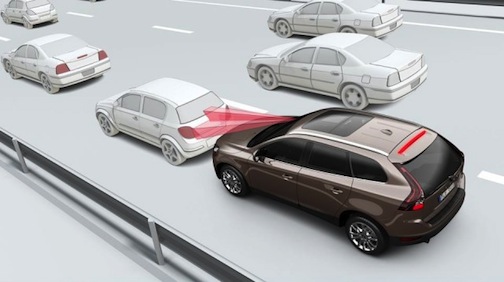Are Collision Avoidance Systems Really Necessary?
Posted on Nov 22, 2022 in Safety | Comments Off on Are Collision Avoidance Systems Really Necessary?

“Hey, watch this, kids,” I said as I lifted my feet off the pedals off my 2013 Subaru Legacy. “This car’s so cool because it senses cars in front of it and stops itself.”
I should mention that I was on the Interstate going about 60 miles per hour as traffic up ahead slowed to a crawl.
With my car careening toward the brake lights, I trusted the car would perform as it always has and apply the brakes before I even had to worry.
Except I started to worry.
The brake lights approached way too fast with no indication that the car had any plans to interfere. I gave it another second before panic set in and I stomped on the brake pedal, safely bringing the car to a stop.
“I value my life, Dad,” my 9-year-old daughter said, panting, after the car screeched to a halt.
“That wasn’t supposed to happen,” I replied.
And this illustrates the problem with automatic collision-prevention systems, which could eventually be legally required in all vehicles.
The reasoning, according to the National Transportation Safety Board, is that the technology will prevent accidents and save lives. The NTSB is not, however, the NHTSA. The National Highway Traffic Safety Administration ultimately is the organization to make the decision, while the NTSB simply recommends it.
There’s no doubt that accident-avoidance technologies can save lives, but if people become too dependent on them, they can cost lives, too.
More often than not the technology works as intended. Boston.com said in its story on the subject:
In a new report, the NTSB investigated collision avoidance technologies and came to the conclusion that cars with collision warning systems (especially ones that have active braking, or technology that can brake on its own or autonomously applying additional brake pressure) could help reduce rear end crashes.
Or, in my case, cause accidents when showing off how well the system works.
I don’t think accident avoidance should be standard on new cars for that very reason. If we, as drivers, assume the car will make up for errors and protect us when we’re not paying attention, we’ll become reliant on the technology instead of using our brains.
Maybe all new cars should be sold with the impression that they are notoriously unsafe. If I thought I was a driving my kids around in a car that required all my senses to keep from crashing, I have a feeling my little girl wouldn’t need to tell me that she values her life.
I really do love the Subaru’s ability to stop in an emergency—I just wish I didn’t know it was there.




